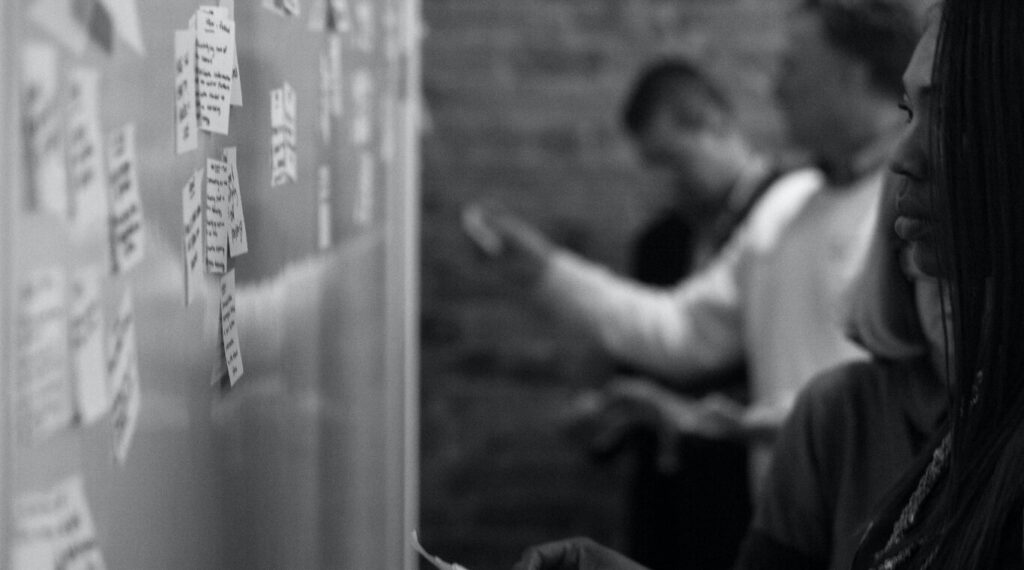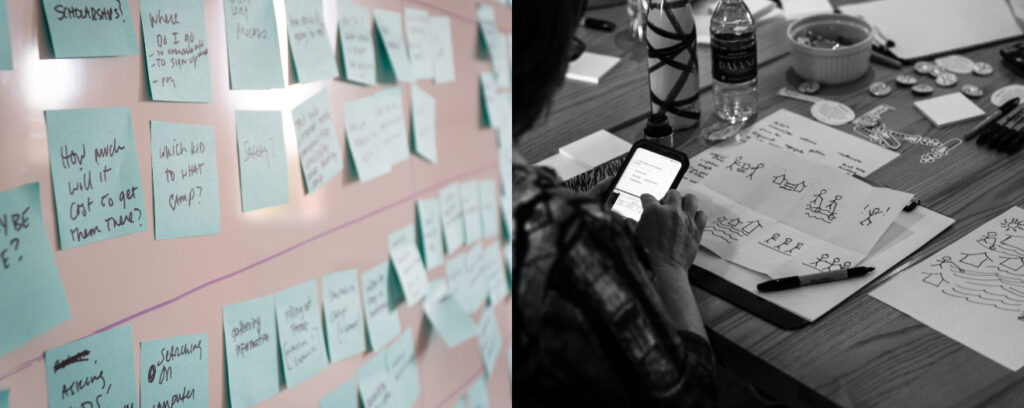Design workshops lay the foundation for the most critical steps in UX design – helping us understand the user, collaborate as a team, find patterns in data, prototype, and sketch ideas. No matter the topic, size, or type of workshop, design workshops represent our innate desire as designers to connect with people and create. As such, a design workshop is a key offering at DS and, as we’ve moved to remote workspaces during the pandemic, we will share some secrets as to how we have adapted this iconic physical activity for the remote world.
In this series, we explore four vital attributes of organizing successful remote workshops and dive into key areas for hosting workshops: facilitation, communication, connection, and visibility.
Facilitation: What does it mean to be a facilitator? How does this key player guide and encourage team involvement?
Communication: Learn how to improve workshop communication, first by setting up an internal team workshop and then exploring how to optimize contact with the workshop participants.
Connection: Discover a way to create “deliberate bonds” during a workshop and how to become intentional about building relationships and a safe space for collaboration.
Visibility: Explore the power of visibility and measurement within the workshop to better understand how it can improve engagement and follow-through.
We hope you enjoy the series.
Workshop facilitation: The facilitator’s role
Facilitators are critical to design workshops, as they are responsible for guiding, planning, and leading workshop activities to ensure a successful meeting for the team and attendees. Effective facilitators should always embody and promote:
- Setting clear goals
- Promoting stable engagement, collaboration, and consensus
- Creating actionable steps to conclude the workshop
Whether you’re in a physical space or online, these core principles should drive conversations and activities.
Establish Goals
A workshop is an opportunity for a team to untangle a problem together by moving through a series of exercises designed to achieve a specific outcome. To deliver value, the facilitator needs to establish and communicate concrete goals prior to the workshop. They must also reinforce those goals during the workshop and continually assess progress towards them, with an ability to pivot and adjust workshop exercises as necessary.
*Tip: A great way to keep track of the facilitator’s goals during a workshop is to set a personal alarm to alert you at each critical point in the workshop. Whether you set a timer on your own computer or ask a team member to remind you, pause at intervals to evaluate progress toward workshop goals. Be prepared to update or modify exercise as necessary – that’s the benefit of being online.
Promote stable engagement
Facilitators should ensure that all participants have an equal say in a workshop. Though every workshop needs a final decision-maker, workshops with more diverse opinions tend to have the best outputs. Ensuring balanced participation can be a challenging task, especially online. A one-sided conversation can inhibit participation by causing others to feel shy about speaking out. The facilitator’s role is to ensure that every individual feels comfortable participating and to seek diverse opinions in each activity.
*Tip: Use smaller breakout rooms for more thoughtful conversations. Another effective approach is to include multiple facilitators for larger online groups to give participants more one-on-one time. Back in the mainstage, be sure to solicit input from individuals by addressing them directly. Shift away from conversations dominated by one or two participants by opening the mic to others.
Build Consensus

Finding common ground within a diverse team of thinkers is an exciting challenge. It’s important for the facilitator to promote discussion and seek input. Agreement is essential to moving the exercises forward and ensuring everyone is aligned.
*Tip: After establishing goals, it’s a great idea to decide what visual frameworks could be included in the workshop. Using facilitation methods like dot-voting or clustering can create collaborative environments and help everyone reach an agreement. Platforms like Miro and Mural include voting capabilities that allow for greater objectivity during the voting process.
Takeaways
Many variables are at play during online workshop facilitation. Ensure that you are always aware of your goals, continually creating engagement from all participants, and ultimately finding mutual agreements.
Contributor




